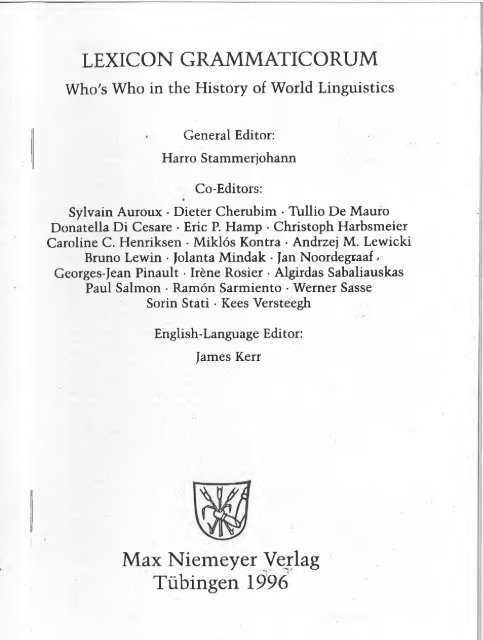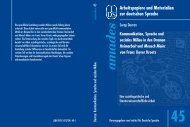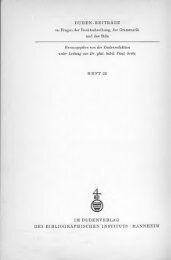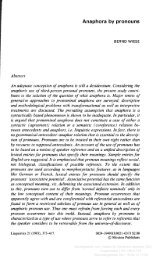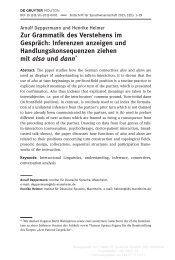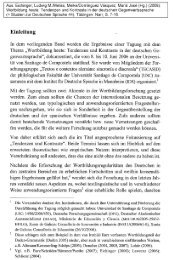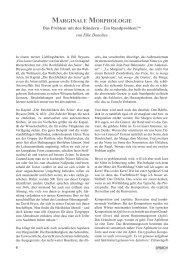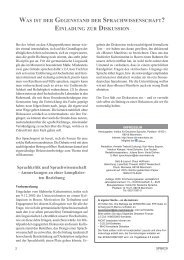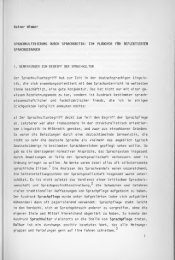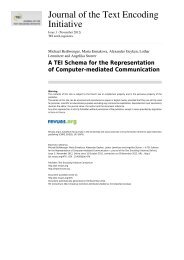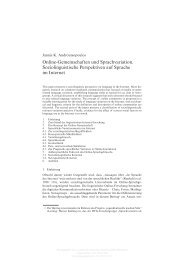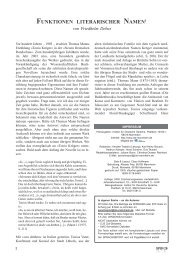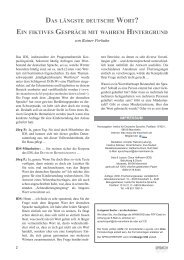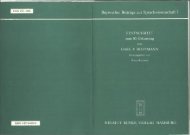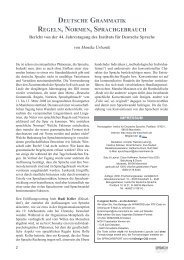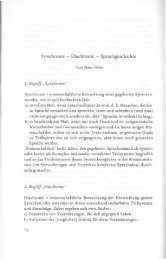Create successful ePaper yourself
Turn your PDF publications into a flip-book with our unique Google optimized e-Paper software.
LEXICON GRAMMATICORUM<br />
Who's Who in the History of World Linguistics<br />
General Editor:<br />
Harro Stammerjohann<br />
Co-Editors:<br />
Sylvain Auroux •Dieter Cherubim •Tullio De Mauro<br />
Donatella Di Cesare •Eric P. Hamp Christoph Harbsmeier<br />
Caroline C. Henriksen •Miklös Kontra •Andrzej M. Lewicki<br />
Bruno Lewin •Jolanta Mindak •Jan Noordegraaf *<br />
Georges-Jean Pinault •Irène Rosier •Algirdas Sabaliauskas<br />
Paul Salmon •Ramön Sarmiento •Werner Sasse<br />
Sorin Stati •Kees Versteegh<br />
English-Language Editor:<br />
James Kerr<br />
Max Niemeyer Verlag<br />
Tübingen 1996
930 Trdvniöek, Frantisek<br />
Neslovesne vety v cestine, II: Vety nomindlni, Brno.<br />
(1931b): Spisovnd ree a nareci ve skole, Praha. (1933):<br />
Cesko-slovensky pomer po straw*■jazykove, Bratislava.<br />
(1935a): “Zaporky ve spisovne cestine”, NR 19,<br />
315-20. (1935b): Historickd mluvnice ceskoslovenskd,<br />
Praha. (1935c): Sprdvnd ceskd vyslovnost, Brno. With<br />
P. VAsa (1937): Slovnik jazyka eeskeho, 2 vols., Praha<br />
(21941, 41952). (1940a): Ndstroj mysleni a dorozumenl,<br />
Praha. (1940b): Spisovnd ceskd vyslovnost, Brno (G.<br />
transl.: Phonetik der tschechischen Schriftsprache, Halle<br />
an der Saale [1954]). (1941a): Strucnd mluvnice ceskd,<br />
Praha (l2l 966). (1941b): “Funkce eeskeho pfizvuku”,<br />
SS 7, 17-21. (1947a): Umeleckd mluva, Praha. (1947b):<br />
Üvod do eeskeho jazyka, Praha (31952). (1948): Mluvnice<br />
spisovne cestiny I, Praha (31951^. (1949): Mluvnice<br />
spisovne cestiny II, Praha. (1951): Cesky jazykospytnv<br />
Strukturalismus ve svetle Stalinova uceni o jazyce, Praha.<br />
(1953a): O jazykovim slohu, Praha. (1953b): Nauka o<br />
slovni zdsobe, Praha. (1954): “K predmetov6mu infinitivu”,<br />
NR 37, 71-3. (1956): Historickd mluvnice ceskd<br />
III: Skladba, Praha (21962). (1961a): “Tak zvany<br />
jmenovaci nominativ”, NR 44, 200-7. (1961b): Ja <br />
zykove zakampi, Brno.— For complete biblio. see below:<br />
Kellner (1948), Prazsky Lingvisticky Krouzek (1938),<br />
Tyl (1958), Vasek (1962).<br />
G r e p l , M. (1988): “Sto let od narozeni F.T.”, NR<br />
71, 216-21. H a v rAn e k , B. (1961): “Za akademikem<br />
F.T.”, S S 27, 161-2. J e d l ic k a , A. (1961): “Za akademikem<br />
F.T.”, NR 44, 193-9. J e l in e k , M. (1961):<br />
“Akademik F.T.”, SFFB U 10, A-9, 5-15. K e l l n e r ,<br />
A. (1948): “Soupis praci F.T. za leta 1938-1948”,<br />
in: A. Gnmd et al., eds., Pocta F. Travnickovi ä F.<br />
Wollmanovi, Brno, 483-532. K r Is t e k , V. (1958): “ K<br />
sedmdesätinäm akademika F.T.”, NR 41, 113-22.<br />
P r a z s k y L in g v is t ic k y K r o u z e k (1938): Soupis praci<br />
Frantiska Trdvnlcka a Franko Wollmana, Praha.<br />
S l o s a r , D. (1988/9): “Akademik F.T. *1888”, CJLit<br />
39, 31-5. T y l , Z. (1958): “Soupis praci akademika<br />
F.T. za leta 1948-1958”, in: V. Machek, ed., Studie<br />
ze slovanski jazykovedy, Praha, 469-76. V a s e k , A.<br />
(1962): “Soupis praci akademika F.T. za leta 1958—<br />
1962”, SFFB U 11, A-10, 231-4.<br />
. r'<br />
Andrzej M. Lewicki<br />
Treml, Lajos —>Tamäs, Lajos.<br />
Trench, Richard Chenevix, b. Sep. 5, 1807,<br />
Dublin, d. Mar. 26, 1886, London; major popularizer<br />
of the history of the E. language.<br />
T. studied from 1825-9 at Trinity College,<br />
Cambridge, and graduated M.A. 1833. Ordained<br />
priest in. 1835, he began the study of<br />
patristic learning and theol. which was later to<br />
form the basis of his ling, research. He was<br />
appointed prof. of Divinity at King’s College,<br />
London, 1846, and consecrated Archbishop of<br />
Dublin, Jan. 1864. T. oversaw the disestablishment<br />
of the Ir. church and resigned in 1884; he<br />
is buried in Westminster Abbey.<br />
Written at the time that comp, philol. gained<br />
its Lite entrance into British intellectual life, T.’s<br />
work has its basis in a distinct hist, perspective.<br />
In his various works he holds lang. to be<br />
the key to understanding the past, since it is<br />
in the semantic developments of words that we<br />
can best trace the history in which such changes<br />
took place. His initial interest derived from his<br />
theol. research, which posited lang. as the “moral<br />
barometer” (1851:59) by which history could<br />
be evaluated. This developed, by way of strong<br />
links with the G. Romantic tradition, into an<br />
interest in the E. lang. as the repository of the<br />
nation’s past. In this respect his work typifies<br />
the mid-Victorian stress on the unity of lang.<br />
and nation in Britain. The later work extends<br />
this interest and it is T. who initiates the major<br />
national and ling, project, the New [subsequently<br />
Oxford\ E. Diet. His paper to the Philol.<br />
Society (1857) indicated the need for a new and<br />
more complete diet, than that of S. —> Johnson<br />
and argued that it be founded upon hist, principles.<br />
It is perhaps his major achievement to have<br />
noted the need for such a project and to have<br />
suggested its format.<br />
(1851): On the study o f words, London. (1853): On the<br />
lessons in proverbs, London. (1859): A select glossary<br />
o f E. words used formerly ,n senies different from their<br />
present, London. (1860a): Some deficiencies in our E.<br />
diets., 2nd ed., revd. and enl., London ( ’ 1857). (1860b):<br />
On some deficiencies in our E. diets.; to which is attached<br />
a letter to the author from H. Coleridge on the<br />
progress and prospects o f the Philol. Soc.'s New E.<br />
Diet., London.<br />
A a r s l e f f , H. (1967): The study o f lang. in England,<br />
1780-1860, Princeton, NJ. C r o w l e y , T. (1989): The<br />
politics o f discourse: the standard lang. question in British<br />
cultural debates, London.<br />
Tony Crowley<br />
<strong>Trier</strong>, <strong>Jost</strong>, b. Dec. 15, 1894, Schlitz, Hesse, Germany,<br />
d. Sep. 15, 1970, Miinster Germany; G.<br />
philologist, specialist in hist, semantics, initiator<br />
of the theory of semantic fields.<br />
After schooling in Barmen, Ruhr, T. studied<br />
G. and Romance philol. and comp, lings, at the<br />
univs. of Freiburg im Breisgau and, after participation<br />
in the First World War and French imprisonment,<br />
Basle and Marburg an der Lahn,<br />
taking his state examination 1920, followed by<br />
further studies at Freiburg until 1923, where he<br />
obtained his doctorate 1923/4 with a thesis on<br />
an hist, and onomastic subject. Having returned<br />
to Marburg, he completed his Habilitation there<br />
about a topic in hist, semantics (publ. 1931).<br />
1932 he was appointed prof. ordinarius at the<br />
Univ. of Miinster, to which he remained faithful<br />
up to his death despite numerous offers, from<br />
other univs. (1936 Heidelberg, 1938 Berlin, 1946<br />
Göttingen, 1951 Basle).
Trissino, Gian Giorgio 931<br />
T. is mainly known for his research on structural<br />
semantics, esp. semantic fields ( Wortfeldforschung),<br />
and for his etymol. studies. The first<br />
of these central themes of his work is already to<br />
be found in his Habilitationsschrift (1931). In this<br />
work T.’s approach to analyzing the meaning<br />
of the words denotating intellectual qualitites<br />
broke with the semasiol. tradition of that time.<br />
Instead of trying to describe the content of the<br />
single words, he emphasized that the meaning<br />
of words could not be appropriately described<br />
without taking into account their relations to<br />
“neighbors” (Begriffsverwandte) in the semantic<br />
field (Wortfeld). The idea of semantic fields,<br />
which later gained great importance within what<br />
is referred to as inhaltbezogene Grammatik (L.<br />
—» Weisgerber, W. -» Porzig) can be understood<br />
as an adaptation of the structuralist ideas of<br />
lang, as a system to the area of word meaning.<br />
This theory was widely adopted, although<br />
some of the original assumptions were harshly<br />
criticized, esp. the idea of the completeness of<br />
the field and some of its epistemol. assumptions<br />
(concerning the innere Sprachform concept). T.<br />
himself later on rarely took part in this discussion<br />
(but cf. his contr. on “Dt. Bedeutungsforschung”<br />
[1934a], which goes back to W.v. -><br />
Humboldt, and the coll. of articles in van der<br />
Lee/Reichmann [1973]).<br />
From 1938 on, T.’s pubis, increasingly reflect<br />
his ethnographically based (onomasiol.) interests<br />
in etymology. He developed a special kind<br />
of etymol. interpretation which tries to explain<br />
the development of G. words from their ‘ergol.’<br />
aspect, taking into account the nature of manual<br />
occupations in order to explain the meaning of<br />
the words in question, e.g. the techniques used<br />
in building fences and houses as well as cultural<br />
development connected with the cutting of rods.<br />
With this idea he continues the Wörter und Sachen<br />
research (cf. R. —> Meringer), relying on<br />
thoughts already brought into the discussion by<br />
J. -» Grijnm. Although the inspiring character<br />
of this work is widely acknowledged and many<br />
of his interpretations are cited in the standard<br />
works of etymol., there is some discussion about<br />
the validity of the genl. assumptions and the<br />
explanatory force of the ergol. basis.<br />
(1924): Der heilige Jodocus. Sein Leben und seine Verehrung.<br />
Zugleich ein Beitrag zur Gesch. der dt. Namengebung,<br />
Breslau. (1931): Der dt. Wortschatz im Sinnbezirk<br />
des Verstandes. Die Gesch. eines sprachlichen Feldes. I.<br />
Von den Anfängen bis zum Beginn des 13. Jahrhunderts,<br />
Heidelberg (repr. 1974). (1932): “Sprachliche Felder”,<br />
Zs fü r dt. Bildung 8, 417-27. (1934a): “Dt. Bedeutungsforschung”,<br />
in: A. Goetze et al., eds., Germ.<br />
Philol. Ergebnisse und Aufgaben. F S fü r O. Behaghel,<br />
Heidelberg, 173-200. (1934b): “Das sprachliche Feld.<br />
Eine Auseinandersetzung”, Neue Jbb. fü r Wiss. und Jugendbildung<br />
10, 42S-49. (1938): “Über die Erforschung<br />
des menschenkundlichen Wortschatzes”, in: Actes du<br />
¡V* congrès intern, des linguistes, Kabenhavn, 9 2 -8 .<br />
(1955): “Die Arbeit als Raum der Wortschöpfung”,<br />
in: FS der Arbeitsgemeinschaft fü r Forschung des Landes<br />
Nordrhein-Westfalen zu Ehren des Herrn Ministerpräsidenten<br />
Karl Arnold, Köln/Opladen, 253-61.<br />
(1966): “Alltagssprache”, in: G. Patzig et al., Die dt.<br />
Sprache im 20. Jahrhundert, Göttingen, 110-33. (1967):<br />
“Name und Technik”, Beiträge zur Namenforschung,<br />
n.s. 2, 131-45. (1968a): Altes und Neues vom sprachlichen<br />
Feld, Mannheim/Zürich. (1968b): “Unsicherheiten<br />
im heutigen Dt.”, in: Sprachnorm, Sprachpflege,<br />
Sprachkritik. Jb. 1966/67 des Inst, fü r dt. Sprache,<br />
Düsseldorf, 11-27. (1972): “Feld, sprachliches”, in: J.<br />
Ritter, ed., Hist. Wb. der Philos., Darmstadt, II, col.<br />
929-33. (1973): Aufsätze und Beiträge zur Wortfeldtheorie<br />
von J.T., A. van der Lee/O. Reichmann eds.,<br />
The Hague/Paris. (1975): “Meine drei Ansätze zur<br />
Wortforschung”, in: H. Beckers/H. Schwarz; eds., Gedenkschrift<br />
für J.T., Köln/Wien, 1-12 (posthumously).<br />
(1981): Wege der Etymol. Nach der hinterlassenen<br />
Druckvorlage mit einem Nachwort hrsg. von H. Schwarz,<br />
Berlin (with biblio).— For a complete biblio. see below,<br />
esp. in: Beckers/Schwarz.<br />
B e c k e r s, H. (1970): “J.T. zum Gedenken”, Hessische<br />
Blätter fü r Volkskunde 61, 246-7. B e c k e r s ,<br />
H./H. S c h w a r z , eds. (1975>: Gedenkschrift fü r J.T.,<br />
Köln/Wien (with complete tfiblio by K. Franke,<br />
369-84). F o e r s t e , W./K.H. B o r c k , eds. (1964): F S<br />
fü r J.T. zum 70. Geburtstag, Köln/Graz (with biblio.<br />
by D. Ader, 490-6). G e c k e l e r , H. (1971): Strukturelle<br />
Semantik und Wortfeldlheorie, 2nd ed., München.<br />
G i p p e r , H./H. S c h w a r z (1962-85): Bibliographisches<br />
Handbuch zur Sprachinhaltsforschung, Teil I, vol. IV,<br />
Köln/Opladen, esp. 3764-80 (with annotated biblio).<br />
L u t z e ie r , P. (1981): Wort und Feld. Wortsemantische<br />
Fragestellungen mit bes. Berücksichtigung des<br />
Wortfeldbegriffs, Tübingen. M o s e r , H. (1971): “Dem<br />
Gedächtnis J. <strong>Trier</strong>s”, in: Sprache und Gesellschaft<br />
[...]. Jb. 1970 (des Inst, für dt. Sprache), Düsseldorf,<br />
323-7. S c h m id t , L ., ed. (1973): Wortfeldforschung.<br />
Zur Gesch. und Theorie des sprachlichen Feldes, Darmstadt.<br />
ScH ürzEicH E L , R. (1980): “J.T.”, Sprachw 5,<br />
146-71. S c h w a r z , H. (1964): “Grundlage und Richtpunkte<br />
der Genealogie sprachlicher Denkformen im<br />
Werke J.T.’s. Eine Würdigung zum 70. Geburtstag”,<br />
Forschungen und Fortschritte 38, 380-2. Id. (1971):<br />
“J.T. zum Gedenken”, WW 21, 60-2. S o d m a n n , T. '<br />
(1971): “J.T. zum Gedenken”, Niederdt. Wort 11, 87-8.<br />
S t a c k m a n n , K. (1973): “J.T. 15. Dezember 1894-15.<br />
September 1970”, Jb. der Akad. der Wiss. iri Göttingen<br />
fü r das Geschäftsjahr ¡972, 106-69. W f js g e r b e r , J.L.<br />
(1971): “Nachruf auf J.T.”, Mitteilungen der Rheinisch-<br />
Westfälischen Akad. der Wiss., Köln/Opladen, 13-7.<br />
W ie s e, B.v./K.H. B o r c k , eds. (1954): F S fü r J.T. zu<br />
seinem 60. Geburtstag am 15. Dezember 1954, Meisenheim<br />
am Glan (with biblio. by M. Giesbrecht, 512-8).<br />
Ludwig M. <strong>Eichinger</strong><br />
Trissino, Glan Giorgio, b. July 8, 1478, Vicenza,<br />
Italy, d. 1550, Rome; critic, poet and tragedian,<br />
protagonist of the It. questione della lingua.


